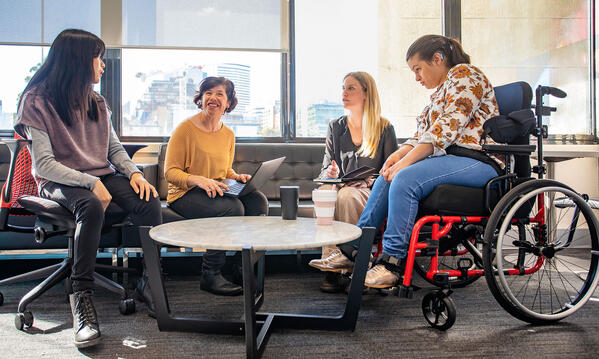Inclusion as an important social responsibility

The Federal Government Federal Government The Federal Government and cabinet is made up of the Federal Chancellor and the Federal Ministers. While the Chancellor holds the power to issue directives, the ministers have departmental powers, meaning that they independently run their respective ministries in the framework of those directives… Read more › seeks to create equal opportunities for people with disabilities. It is working towards an inclusive society in which everyone can participate equally: at school, at work, in leisure time. This requires comprehensive accessibility – and the aim is to remove not only obstacles in buildings, on streets and paths, but also social hurdles, such as access to the labour market.
National action plan
In 2007 Germany was one of the first states to sign the United Nations United Nations The United Nations (UN) has a key role to play in the international system. Germany has been a UN member since 1973. Since joining, Germany has taken on more and more responsibility and is now one of the largest donors and supporters of the United Nations. For example, Germany is the second largest… Read more › Convention on the Rights of Persons with Disabilities, with a national action plan (NAP 2.0) structuring its implementation that involves 175 different measures in 13 action areas. Among other things, it envisages intensive preparation measures for working life for severely disabled youths. Going beyond the action plan, a federal participation law was enacted in 2017, which includes provisions for promoting education for young disabled people.
The status report produced in 2023 shows that national implementation of the Convention still has high priority for the Federal Government Federal Government The Federal Government and cabinet is made up of the Federal Chancellor and the Federal Ministers. While the Chancellor holds the power to issue directives, the ministers have departmental powers, meaning that they independently run their respective ministries in the framework of those directives… Read more › . In recent years, the various ministries have rolled out more than 400 measures and are thus consistently pursuing the NAP. The measures help raise awareness of the needs of disabled people amongst social-sector and state actors.
Intensive dialogue between the generations
The elderly constitute a further group whose needs and potential the Federal Government Federal Government The Federal Government and cabinet is made up of the Federal Chancellor and the Federal Ministers. While the Chancellor holds the power to issue directives, the ministers have departmental powers, meaning that they independently run their respective ministries in the framework of those directives… Read more › particularly has in mind. Roughly 22 percent of people in Germany are aged 65 or older. Their wealth of experience is considered beneficial to society. Their ways of life have likewise diversified and changed; overall elderly people are considerably more active today than in the past. They are frequently also still integrated in the labour market. As meeting places, around 540 multigenerational houses promote an intensive dialogue between old and young, bringing together people of different ages.


